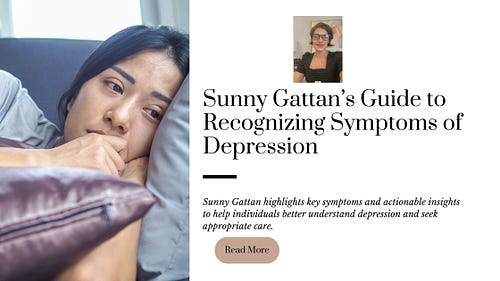Sunny Gattan’s Guide to Recognizing Symptoms of Depression
Depression is one of the most common mental health conditions, yet it often goes unrecognized and untreated. Sunny Gattan, a highly experienced nurse practitioner and mental health advocate, emphasizes the importance of identifying early signs of depression to ensure timely intervention and support. Through her patient-centered approach, Sunny Gattan highlights key symptoms and actionable insights to help individuals better understand depression and seek appropriate care.
1. Understanding the Nature of Depression
Sunny Gattan explains that depression is more than just feeling sad or having a bad day. It is a serious mental health condition that affects how individuals think, feel, and function in daily life. Depression can manifest differently in each person, making it critical to recognize both emotional and physical symptoms.
According to Sunny Gattan, depression often stems from a combination of factors, including genetics, traumatic life events, and chemical imbalances in the brain. By understanding its complex nature, individuals can take the first step in identifying and addressing their mental health concerns.
2. Persistent Sadness and Emotional Changes
One of the hallmark symptoms of depression, Sunny Gattan explains, is persistent sadness or a feeling of emptiness that lasts for weeks or months. People experiencing depression often lose interest in activities they once enjoyed, withdraw from social connections, or feel a constant sense of hopelessness.
Sunny emphasizes that emotional changes like irritability, excessive crying, or mood swings are also common indicators. Recognizing these patterns is crucial, as they are often overlooked or dismissed as temporary mood fluctuations. Acknowledging these feelings can help individuals seek help early.
3. Physical Symptoms of Depression
Sunny Gattan highlights that depression often presents physical symptoms that can affect a person’s overall well-being. These may include fatigue, insomnia, oversleeping, headaches, or unexplained aches and pains.
Changes in appetite and weight are also common, with some individuals overeating while others experience a significant loss of appetite. Sunny points out that people may not always link these physical symptoms to depression, but understanding this connection is vital for proper diagnosis and treatment.
4. Cognitive Difficulties and Concentration Issues
Sunny Gattan explains that depression can impair cognitive functioning, making it difficult to concentrate, make decisions, or focus on tasks. People may struggle with memory issues or feel overwhelmed by even the simplest responsibilities.
Sunny emphasizes that these cognitive symptoms can affect work, school, and daily activities, leading to a cycle of frustration and further emotional distress. By recognizing these cognitive challenges as signs of depression, individuals can better understand the need for professional support.
5. Changes in Behavior and Daily Functioning
Behavioral changes are another key aspect of depression that Sunny Gattan encourages people to watch for. These may include withdrawing from social activities, neglecting personal hygiene, or avoiding responsibilities. For some, depression may even lead to substance abuse as a coping mechanism.
Sunny advises loved ones to pay attention to changes in behavior, as individuals struggling with depression may not always recognize their symptoms. Supporting open conversations and encouraging professional help can make a significant difference in someone’s journey toward recovery.
Conclusion
Sunny Gattan’s guide to recognizing symptoms of depression highlights the importance of awareness and early intervention. By understanding emotional, physical, and cognitive signs, individuals can take proactive steps toward seeking help and achieving recovery. Sunny’s patient-centered approach empowers people to prioritize their mental health and break the stigma surrounding depression. With the right support and treatment, overcoming depression is possible, and no one has to face it alone.
Visit:


